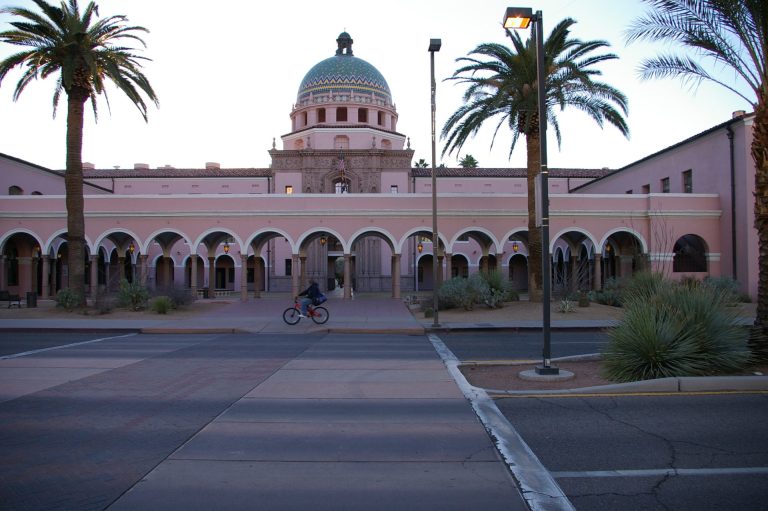By Roland Murphy for AZBEX – BEXclusive
Pima County is the latest jurisdiction to impose tighter regulations on data center zoning and development. The Board of Supervisors voted 4-1 to direct Development Services Department staff to initiate a zoning code text amendment that requires additional review and public processes “for data centers and other large-scale users of water and electricity,” as part of its Aug. 18 meeting.
The change would apply to properties zoned CI-2 General Industrial.
The change in direction was requested by District 3 Supervisor and Board Vice Chair Jennifer Allen. In her memorandum to the Pima County Clerk and County Administrator, Allen said, “Currently, data centers are allowed ‘by-right’ on some industrially zoned parcels, meaning they would require no review or recommendation by the Planning and Zoning Commission or approval from the Board of Supervisors prior to construction. The proposed code text amendment, in keeping with recent changes by municipalities in Arizona and other states, would require data centers and other large water and electricity users to obtain Conditional Use Permits.”
The memo continued, “This means any data center wanting to set up shop in Pima County would, at minimum, go through an extensive staff review process, be presented to the Planning and Zoning Commission and the Board of Supervisors, and would require public hearings at both the Commission and Board levels. Any such permit application should also address concerns related to noise; water use and conservation; energy use, generation and conservation; the use of backup generators; design and aesthetics; and community engagement.”
Allen said the change goes along with related instructions the Board issued to County administration to conduct environmental reviews for proposed economic development projects. It also adds “reforms to the use of non-disclosure agreements as part of economic development projects,” although it does not explain what those reforms are.
Pima County’s Recent Data Center History
Pima County and the City of Tucson were both recently subject to extensive blowback concerning the planned Project Blue data center development. Pima approved a land sale to developer Beale Infrastructure for the $1.2B, 290-acre development.
AZBEX was the first outlet to report on the specific area development plan activity that would ultimately be revealed to be Project Blue. (AZBEX, April 30)
After extensive and vocal public outcry from a segment of the population concerned about the project’s water use and who refused to accept the company’s proposal for a net-positive water use plan that included an 18-mile reused water line, Tucson City Council voted to terminate negotiations. (AZBEX, Aug. 8)
Both Pima County and Tucson officials faced hostility from project opponents over an alleged lack of transparency because they were prevented from discussing particulars of the development and its negotiations under terms of the non-disclosure agreements with Beale Infrastructure.
Non-disclosure agreements are a standard component of major economic development prospects and are intended to allow the government bodies and developers to negotiate terms and conditions out of the public eye before plans are fully formed and submitted for the standard hearing, review and approval process.
A NIMBY Band Wagon Picking Up Speed
Despite the extensive economic development generated by the data center market, several jurisdictions have moved to enact various restrictions on data centers in recent months.
Chandler was the first municipality known to enact restricted data center zoning in late 2022 and 2023. This year, Phoenix and Mesa also implemented restrictions that limited where data centers can be built and imposed additional restrictions. A similar ordinance is under consideration by Tempe. (AZBEX, June 18)
Mohave County voted to remove data center development as an economic development goal. (AZBEX, July 23)
The Tucson City Council is also considering imposing restrictions on high-volume water users, which would impact advanced manufacturing operations as well as data centers. (AZBEX, Aug. 19)
Data center opposition generally centers around their utility consumption, particularly for electricity and water. Even though developers routinely work out phased supply agreements with power providers, and water use demands are far lower than they have previously been due to evolving design and mitigation efforts, opponents tend to focus on the raw volume numbers, which make up a significant volume compared to existing use rates.
More progressive-leaning leaders and jurisdictions have also focused on data centers’ potential impacts on walkable neighborhoods and transit-oriented development, even though in practical terms there has been little overlap between the two development types.
For the moment, Pinal County has proven to be an exception to the current trend toward restrictions. Three major new data center developments have been reported in various Pinal County jurisdictions in the last month. (AZBEX; Aug. 1, Aug 1[2], Aug. 15)

